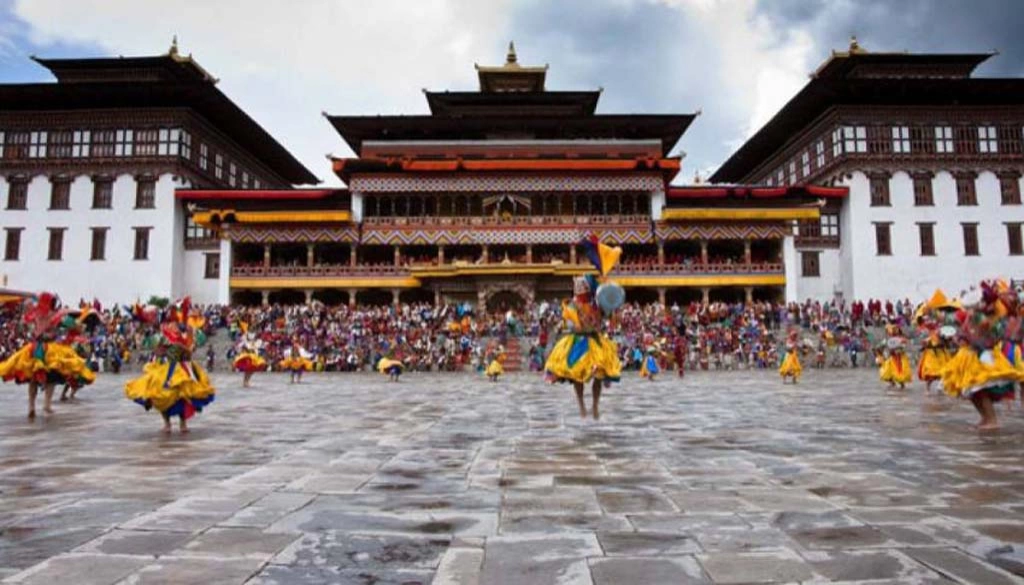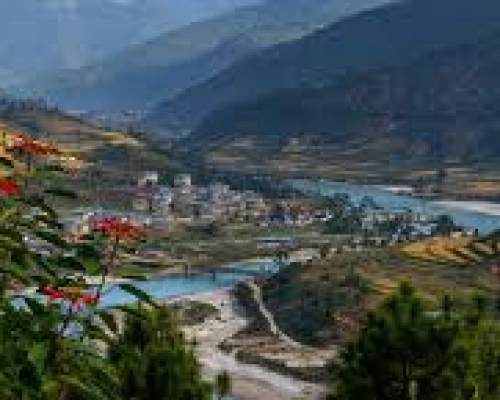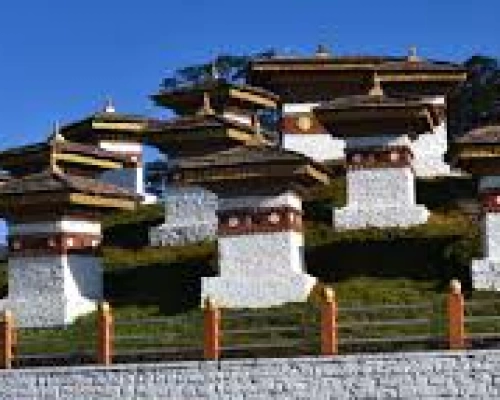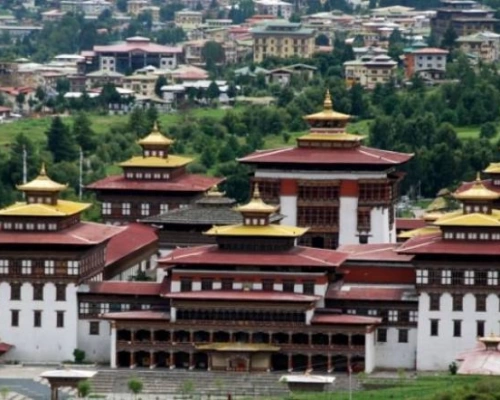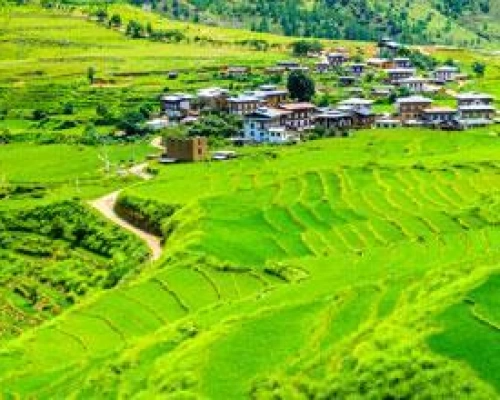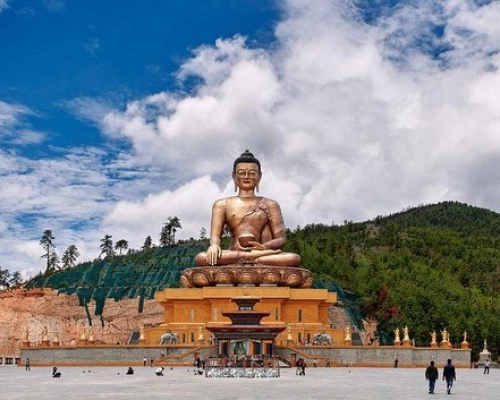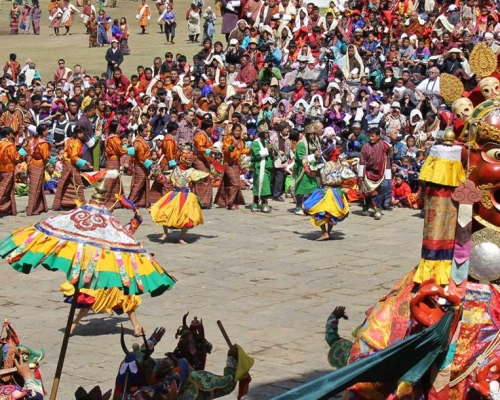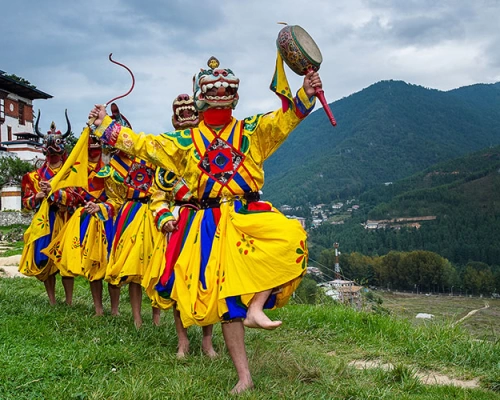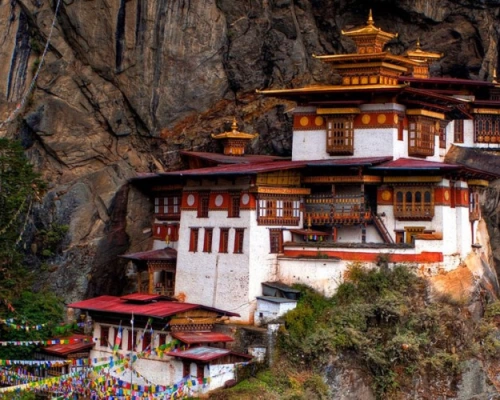This popular Bhutan cultural tour provides an in-depth view into the ancient way of life and rich culture that still thrives in Bhutan today through the western valleys of Paro, Thimphu, Punakha and Wangduephodrang. It is a well paced tour, designed to provide the opportunity to really savour the unique highlights of Bhutan’s western districts which offer diverse mountainous landscapes, a rich Buddhist heritage including monasteries, temples and chortens, historical fortresses and an extremely hospitable people. You will discover the vibrant history of Bhutan visiting the Ta Dzong Museum, Rimpong Dzong with its wooden cantilevered bridge and the infamous Taktsang Monastery (Tiger’s Nest) in the beautiful Paro Valley. In Bhutan’s capital, Thimphu, you will visit the The National Memorial Chorten, 12th century Changangkha Temple and the National Library exhibiting ancient scriptures before crossing the 3050m Dochula Pass with its 108 chortens, numerous prayer flags and spectacular Himalayan views into the sub-tropical Punakha Valley featuring the incredible Punakha Dzong and Chimi Lhakang, temple of the ‘Divine Madman’.
Explore Bhutan - 10 Days
- Duration 10 Days
- Trip Grade Easy
- Starts/Ends Bhutan to Bhutan
- Group Size 1-10
- Best Season March, April, May and September, October, November
Itinerary
The flight into the Himalayas reveals scenic and breathtaking views of Himalayan Mountains of the world. If weather permits you will be able to see Mt Everest (8848m, 29,198ft) and other Himalayan mountain ranges. After checking into the hotel later visit,
Zorig Chusum Institute: The 13 arts and Crafts institute. The two main objectives of the institute are a) to preserve and promote the traditional arts and crafts and b) to create job opportunities for the underprivileged group of the society.
Textile museum: It was established with the aim of preserving and promoting Bhutanese textile arts.
Paper factory: The handmade paper making in Bhutan stemmed from the age old tradition originated in 8th century of Bhutanese history. The handmade paper constitutes as valuable National heritage of Bhutanese cultural identity and is preserved through all the ages. The Traditional paper is recognized and held high esteem both in home and outside world.
Memorial Chorten: This particular chorten was constructed in 1974 as a memorial for the third King of the country, King Jigme Dorji Wangchuck, who is widely regarded as the father of modern Bhutan.
Mini zoo: Here you can see just one animal – Bhutan’s national animal- the Takin. This is an extremely rare member of the goat family. Found in herds in the very high altitudes (13,125ft and over). They live on a diet of grass and bamboo.
Sangaygang View Point: The view point is also the perfect place to take in some truly breathtaking views of the entire city of Thimpu and also later visit Kuenselcholing hilltop where the largest Buddha in the world is being built.
Tashichho Dzong : The names means – Means Fortress of Glorious Religion. It was built in 1641 by Zhabdrung Ngawang Namgyel. It houses the secretariat building, the throne room and the office of the king, and the central monk body.
In the evening if you wish, we can make arrangements under your request to take you to enjoy the recent trends of the younger Bhutanese, who spend their evenings in the discotheques, or in the entertaining hubs where there are live performances of Bhutanese songs and dances (traditional and modern) by the best Bhutanese bands. If you wish you can even test your singing talents in the bars that offer Karaoke. Overnight in Thimphu
Morning visit the weekend market: Held every Friday, Saturday and Sunday, the people crowd the stalls every day, dressed in full colour and gathered to meet and to barter, much like the street markets in London!
Later take a hike to Cheri Monastery(Includes Dodina and Jigme Dorji Wild life Sanctuary): Hike about 1hrs(to and fro) leds to Cheri Goemba (Cheri Dorji Dhen). Zhabdrung Ngawang Namgyal built this monastery in 1620 and established the first monk body here. A chance to spot birds such as Mrs Gould’s Sunbird, Yellow-browed Tit, Yellow-rumped Honeyguide, Long-billed Thrush, Ultramarine Flycatcher.
Folk Heritage museum: It was inaugurated by Her Majesty the Queen Ashi Dorji Wangmo Wangchuck, who is the founder and patron of the Museum, on 28th July 2001.It is dedicated to connecting people to the Bhutanese rural past through exhibition of its items and artifacts used in rural households.
Thangtong Dewachen(Nunnery): It was founded in 1976 by Rikey Jadrel, who is considered as emanation of Thangthong Gyalpo(1363 – 1485), the builder of numerous iron chain bridges across the Himalayas. Later just stroll around the city and see how local live and do some shopping. Overnight in Thimphu.
Morning driving towards Trongsa(, we come across a pass known as Dochula (3140m, 10362ft from where a beautiful panoramic view of the Himalayan mountain range can be seen, especially in clear winter days. The beauty of this place is further enhanced by the Druk Wangyal Chortens- a 108 stupas built by the eldest Queen, Her Majesty Ashi Dorji Wangmo Wangchuck. Overnight in Trongsa.
Morning visit, Trongsa Dzong: It was built by Chhogyel Mingyur Tempa (sent by Zhabdrung to unify Eastern Bhutan to bring under the rule of the Desi) in the year 1644The dzong dominates the horizon, dwarfing the surrounding buildings. Both the First and the Second King ruled the country from this Dzong. And also visit the Trongsa Museum. Later drive to Bumthang valley. On the way visit Hand Loom shops. Overnight in Bumthang.
Morning visit, Jakar Dzong :The Dzong was initially built as a monastery in 1549 by the great grandfather of the Zhabdrung.
Jambay Lhakhang: It is one of the 108 monasteries built by King Songtsen Goenpo in the 8thcentury to subdue evil spirits in the Himalayan region.
Kurjey Lhakhang: Means body print. It dates back to 8th century when Guru Rimpoche first visited Bhutan. It is after his visit to the Monyul (country in the darkness); Buddhism was introduced in the country.
Then hike across to Tamzhing Lhakhang: “Temple of good message”. It was built by Terton Pema Lingpa (Treasure Discoverer) in 1501AD. We can see the paintings done by him on the wall and an iron jacket which was also made by him.
Mebar Tsho(Lake of Burning Fire):This is a sacred lake for Bhutanese who believe that Pema Lingpa discovered religious treasures from this lake in the 12th century. Later stroll around the town. Overnight in Bumthang.
Morning visit Ogyen Choling Palace: It is a village in the Tang valley of Bumthang district. It is located on a commanding spur at an elevation of 3000m, on the east side of the Tang Chu. Visitors have to cross the Tangchu suspension bridge near Kizom and climb up to the village on foot. The trek takes about 45 minutes. Kizom is approximately 33 km from Jakar. The palace has been converted in a museum these days. Later drive to Gangtey. Overnight in Gangtey.
Morning visit the Phobjikha Visitor Centre: This is the crane information centre. Stopping here first also ensures that visitors become aware of the codes of conducts for the conservation area.
Later we will go for a Gangtey Nature Trail: (Duration: Half day: two hours at a quicker pace): This is one of the most beautiful and shortest of the existing nature trail. In this trail you have the opportunity to visit the magnificent Goemba(Monastery), it also leads to sloping area of green grass, flanked by pine trees on either side. You will even come across some villages, rivers, crane roosting ground. Later drive to Punakha valley Overnight in Punakha.
Morning visit, Punakha Dzong (fortress): Built in 1637 by Zhabdrung which is remarkably located between the rivers of Mo (Female) Chu (river) and Pho (Male) Chu. Until the time of second king it served as a seat of the king.
Chimi Lhakhang(Temple of fertility): This Temple was built by lam Drukpa Kuenley (The Divine Madman) in 1499. It is about thirty minutes hike across fields from the road –Wooden phalluses are often found hanging in the four corners of the houses and also phalluses are painted on the walls of houses. It is the common belief that this helps in driving away evil spirits. Later drive to Paro valley
Later visit, Ta Dzong: This means – watch tower, which it served as during the 17th century to guard the region from the Tibetan invasion. It was converted to the National Museum in 1968.
Rimpung Dzong: Means fortress of the heap of jewels. It was built during the time of Zhabdrung (deeply revered to this day as dynamic political and spiritual leader) in 1644It is also the venue for the Paro festival (Tsechu.
Kichu Lhakhang(Monastery): It is one of the two most sacred and the oldest temples in Bhutan. It was built in 7th century by Tibetan King Songtsen Gampo. Overnight in Paro.
Hike to Taktshang Monastery (Tiger’s nest): This is Bhutan’s most recognizable cultural iconperched 800m/2640ft up a seemingly sheer cliff. Although it was tragically and mysteriously consumed by fire in April 1998 it has now been restored to its former glory. It is believed that in the 8th century, the great tantric master Guru Rimopche/ Padmasambhava (2nd Buddha) flew on the back of a tigress to the site where the monastery now stands. Three hours hike
Visit Farmhouse: Eating, taking bath and staying for a night at a local farmhouse gives a different variation, and a chance to see the inside of such a home, rather than just the brightly decorated exteriors. Later stroll around the town and see how locals live. Overnight in Paro
Early breakfast at the hotel and then drive to the airport and we will assist you with exit formalities and bid you farewell.
This itinerary is not suited for you? Plan your own trip.
What's Included
- 9 Nights 10 days at 3* hotel accommodation with WiFi (Luxury hotels will be charged separately)
- Personal specialized English speaking guide & driver with SUV
- Visa Fee
- Breakfast, Lunch & Dinner (excluding alcoholic drinks)
- Tea and Snacks
- All entrance fees & sightseeing including Monasteries & Dzongs etc
- All the transportation by private vehicle
- 100$ Bhutan Government daily royalties which goes for free education and free health services for the Bhutanese people, and other taxes
- Mineral water all time during the tour
- Airline Tickets
- Travel Insurance
- Meals, other than Mentioned
- Various expenses such as room service, beverages, personal calls, souvenirs, etc.
- Tips for Guide and Driver
Dates and Prices
| Date | Price | Availability | ||
|---|---|---|---|---|
| Start DateStarts: MondayFeb 09, 2026 | End DateEnds: WednesdayFeb 18, 2026 | PricePriceUS$3575 | StatusStatusAvailable | |
| Start DateStarts: MondayFeb 16, 2026 | End DateEnds: WednesdayFeb 25, 2026 | PricePriceUS$3575 | StatusStatusAvailable | |
| Start DateStarts: MondayFeb 23, 2026 | End DateEnds: WednesdayMar 04, 2026 | PricePriceUS$3575 | StatusStatusAvailable |
